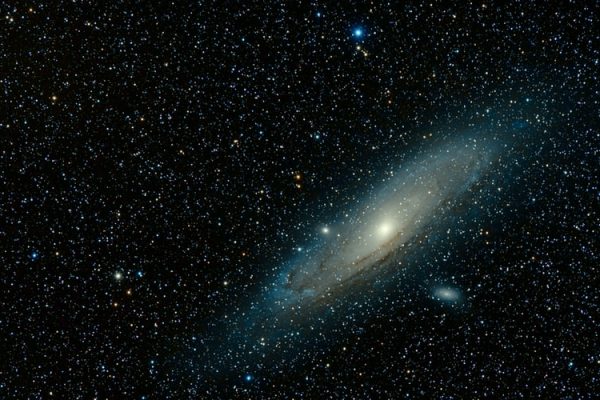“And He shows you His Signs; so which of the Signs of Allah will you deny?” (Quran 40:81)
“And He shows you His Signs; so which of the Signs of Allah will you deny?” (Quran 40:81)
“See you not that whoever is in the heavens and whoever is on the earth, and the sun, and the moon, and the stars, and the mountains, and the trees, and living creatures, beasts and many of mankind prostate themselves to Allah” (Quran; 22:18)
As shown in the previous chapters, Allah (SWT) has created the universe and then imposed some Divine Forces and Divine Laws by which the natural equilibrium of all creation functions. Certainly that the perfection in the skies, the plants, the oceans, the mountains, the animals and the alternation of the day and night and the process of childbirth is certainly a clear Sign (Ayah) of the existence of these Divine Forces and Divine Laws.
” He is Allah, there is no deity but He. He is the Knower of the unseen and the seen. He is ar-Rahman (Most Compassionate), ar-Raheem (Most Merciful). He is Allah besides Whom there is no deity. He is al-Malik (Sovereign), al-Quddus (Most Pure), as-Salaam (Giver of peace), al-Mumin (Giver of security), al-Muhaiman (Vigilant), al-Aziz (Migthy), al-Jabbar (Overpowering), al-Mutakabbir (Glorious). He is pure from whatever they ascribe to Him. He is Allah, al-Khaliq (Creator), al-Bari (Perfect Maker), al-Musawwir (Fashioner); to Him belong the most beautiful names. Whatever is in the heavens and the earth glorifies Him. He is al-Aziz (Mighty), al-Hakeem (Wise).” (Quran 59:21-24)
More than the awareness of His Divine Forces and Divine Laws in the universe, according to this Quranic verse, the universe has also so many marks (Ayat) of the Beautiful Names of Allah (SWT).
For example, knowing that there are stars billions of light-years from Earth is certainly a sign to glorify Him by His Beautiful Name “The Magnificent”. Listening to the waves crashing against the cliffs will remind us of His Beautiful Name “The All-Strong”. The beauty of nature during spring could be a sign of the magnificence of Heaven and His Beautiful Name “Lord of Majesty and Generosity”.
Moreover, the harshness of winter or the intensity of summer can serve as reminders of the fear of hellfire and His Beautiful Name “The Reckoner”. Finally, watching the beautiful smile of a mother holding her baby is a sign of the Love of Allah (SWT) for all human beings by His Beautiful Name “The Most Loving”.
“And they reflect on the creation of the heavens and the Earth ˹and pray Our Lord! You have not created ˹all˺ this without purpose. Glory be to You! Protect us from the torment of the Fire (Quran 3:191).
Therefore, observing, and contemplating nature is a very important aspect of a Muslim’s spiritual journey. Indeed, in this Quranic verse, Allah (SWT) commands us to ponder over His creations. Why? Because the first realization we encounter is undoubtedly Al-Tawheed (the Oneness of Allah (SWT)) as Allah (SWT) says,
“Had there been any gods in the heavens and the Earth apart from Allah, the order of both the heavens and the Earth would have gone to ruins. Glory be to Allah, the Lord of the Throne, Who is far above their false descriptions of Him” (Quran 21:22)
In fact, Allah (SWT) communicates with us by “sending” His Ayat by reading the Holy Quran and contemplating the universe. The universe is certainly a silent Quran to wonder its splendour with admiration and humility. Therefore, knowledge in Islam includes both worldly knowledge (Ayat from universe) and religious knowledge (Ayat from Quran).
“And Allah has extracted you from the wombs of your mothers not knowing a thing, and He made for you hearing and vision and intellect that perhaps you would be grateful”(Quran 16: 78)
Based on this Quranic verse, Allah (SWT) initially creates humans without knowledge. However, with His Mercy, we are then created with five senses to experience His Ayat in the universe and with El Aql (mind) to think about what we experience.
“They replied: Glory be to You! We have no knowledge except what You have taught us. You are truly the All-Knowing, All-Wise.” (Quran 2:32)
Therefore, Allah (SWT) is the ultimate source of all knowledge. He teaches humans all unknown things as Allah (SWT) taught Adam the basics of all sciences. Allah’s knowledge has no beginning or end and is not based on trial and error. However, human beings must necessarily acquire knowledge by what we observe in nature as Allah (SWT) says “But above those ranking in knowledge is the One All-Knowing (Quran 12: 76).
Knowledge from Allah (SWT) is in fact the Life and Light that help believers see the Truth as Allah (SWT) says “And is one who was dead, and We gave him life and made for him light by which to walk among the people like one who is in darkness, never to emerge therefrom? (Quran 6 :122).
To reinforce this Quranic verse, The Prophet (SAW) said: “If anyone pursues a path in knowledge, Allah (SWT) will thereby make easy for him a path to the Paradise; and he who is made slow by his actions will not be speeded by his genealogy” [Kitab Al-Ilm: Book 19, Number 3636:]. Moreover, The Prophet (SAW) also said “Seeking knowledge is an obligation for every Muslim man and woman” [ Sunan Ibn Mājah 224].
“And He shows you His Signs; so which of the Signs of Allah will you deny?” (Quran 40:81)
The importance of knowledge is repeatedly emphasized in the Noble Quran with frequent injunctions, such as “God will exalt those of you who believe and those who have knowledge to high degrees” (Quran; 58:11);“O my Lord! Increase me in knowledge” (Quran; 20:114) and “As God has taught him, so let him write” (Quran; 2:282).
Such Quranic verses provide a forceful stimulus for the Islamic community to strive for education and seeking knowledge. The knowledge as described in the Quran and the Sunnah is comprehensive and covers every area of life, including all aspects of natural and social sciences.
For example, there are around 750 verses in the Quran dealing with natural phenomena. The Quran also made clear statements about some scientific facts that were later confirmed by scientific research for instance as regards to the structure of the embryo, our solar system, and the creation of the universe .
Therefore, studying natural and social sciences is part of Islamic fundamentals of faith (Iman). Consequently, Muslim Scientists cannot study the universe and human behaviour separately from The Holy Quran and Sunnah.
“Produce your proof if you are truthful.” (Quran 2:111).
Based on this Quranic verse, Allah (SWT) commands us to always bring the proof for any scientific claim. For example, the empiricism (The practice of basing ideas and theories on testing and experience) in modern natural and social sciences is a known reality of our epistemology.
Indeed, Allah (SWT) announces this fact clearly in the following Quranic verse “And pursue not that of which you have no knowledge; for every act of hearing, or of seeing or of (feeling in) the heart will be inquired into (on the Day of Reckoning)” (Quran 17:36).
In other words, our conclusion should not be based on superstitions but rather on scientific analysis to come up with results and final decisions in all facets of our life.
“He it is Who gave the sun radiance and the moon light and determined the stages (for the waxing and waning of the moon) that you may learn the calculation of years and the reckoning of time. Allah has created all this with a rightful purpose (rather than out of play). He expounds His signs for the people who know” (Quran 10:5)
Muslim scholars of the Golden Age of the Islamic civilization were keenly aware of these signs (Ayat) given by Allah (SWT) in this Quranic verse and were deeply fascinated by them. Consequently, Muslim scientists of medieval Muslim civilization (e.g. Ibn Al-Haytham) greatly influenced modern science.
“Allah is the Creator of all things, and He is the guardian of all things.” (Quran; 39:62),
In conclusion, the concept of science in Islam is the concept of The Tawhidic Paradigm, namely the belief in Allah (SWT) alone in all aspects of His creation and Commands in the universe. In fact, seeking knowledge without Tawheed will cause humans to forget themselves and neglect their divine obligations and goals in life.
On the other hand, a Muslim who does not seek knowledge is not fulfilling the divine duty and cannot build a strong Ummah because knowledge should be learned as Allah (SWT) says “And that man attains only what he strives for (Quran 53:39)





